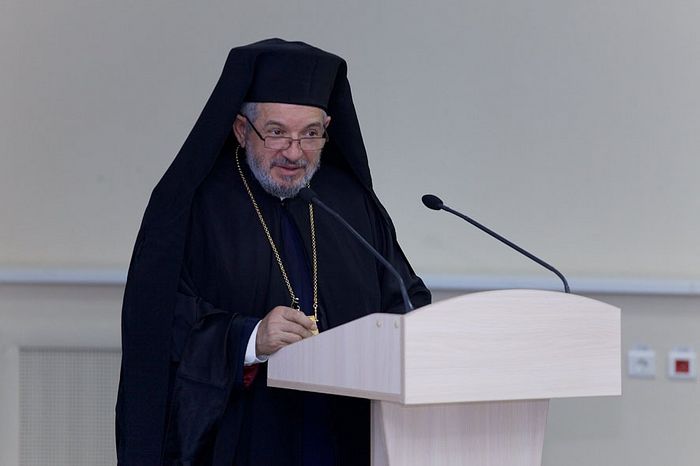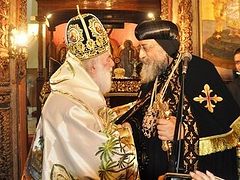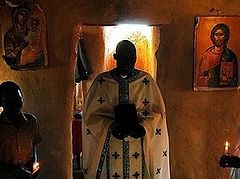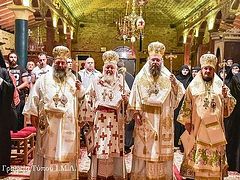Harare, Zimbabwe, March 11, 2020
 Met. Seraphim of Zimbabwe. Photo: ifuocn.com
Met. Seraphim of Zimbabwe. Photo: ifuocn.com
While Patriarch Theodoros of Alexandria resolved to recognize the schismatic “Orthodox Church in Ukraine” and “Metropolitan” Epiphany Dumenko as the head of an autocephalous Church in November, proclaiming that this move would lead to a solution to the Ukrainian crisis, not all of the hierarchs of the Patriarchate of Alexandria agree with him.
In a recently-published text on the Triumph of Orthodoxy (published in English by Orthodox Synaxis), His Eminence Metropolitan Seraphim of Zimbabwe writes conversely that, “The reason that the Church is so strict is that those who do not have canonical ordination simply do not have the grace of the Holy Spirit and therefore they lead us to schisms and heresies.”
Met. Seraphim has spoken out against Constantinople’s interference in Ukraine and against recognition of the OCU several times, and in his new text, he writes, referring to His Beatitude Archbishop Anastasios of Albania, that the Ukrainian issue poses a threat for all of Orthodoxy.
Noting that the attempts of heretics throughout Church history to distort true Christian teaching are, in fact, “an attempt to block the path of man’s salvation,” he writes:
This is why His Beatitude the Primate of the Orthodoxy Church of Albania, Archbishop Anastasios Yannoulatos, as one of the leading theologians of Orthodoxy, recently stressed with regard to the Ukrainian issue that is endangering the entire Orthodox world, among other things, that by recognizing laymen who have never received canonical ordination, the canonical order of Apostolic Succession is placed in jeopardy.
In a statement published in October, Met. Seraphim also warned that if the Local Churches do not come together to solve the Ukrainian issue, it threatens “the greatest schism that the Orthodox Church will know in the course of her history.”
Again, following Abp. Anastasios, Met. Seraphim also writes in his new text that the Ukrainian issue has led to the Eucharist being abused “as worldly blackmail for matters of ecclesiastical jurisdiction” and to the breakdown of the Church’s ability to answer ecclesiastical crises conciliarly, as opposed to how the Church responded to Iconoclasm, the defeat of which is celebrated on the Sunday of Orthodoxy.
The Church must show respect, Met. Seraphim writes, for “those who endowed us with the functioning of the institution of the Pan-Orthodox Conferences that began over the past sixty years with the participation of all the Local Orthodox Churches.” In his October text, he noted that it was these pan-Orthodox councils that developed the procedure for how to grant autocephaly, which Constantinople ignored in the case of Ukraine.
“This respect is, after all, a function of the canonical principle of apostolic succession,” he adds. Met. Seraphim then cites a three-pronged proposal for solving the Ukrainian crisis recently made by another hierarch “who enjoys special esteem and respect from all the Local Orthodox Churches”:
First, that the fullness of time for Ukraine’s autocephaly has come. Second, those who were never ordained with the canonical order of the Orthodox Church should be ordained with a canonical ordination. Third, that the head of the Autocephalous Church should be kyr Onuphry and the vice-president kyr Epiphany.
Furthermore, any canonical settlement must express the voice of the primates as well, and the Patriarchate of Moscow must continue to have access to and a spiritual relationship with its spiritual center in Kiev.
Recall that in an interview with BBC Ukraine last spring, Epiphany Dumenko rejected the possibility of the OCU’s clergy being re-ordained, despite the fact that several Local Churches have expressed either the outright rejection of their clergy or serious reservations about serving with clergy who were ordained while in schism.
“Man is neither edified nor saved with a lie,” Met. Seraphim writes. And anything that does not serve for the unity of the Church “is from the evil one,” he wrote in a text published in June.




